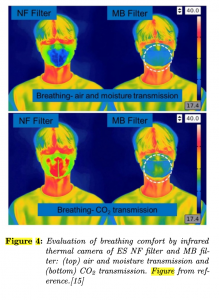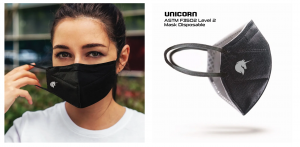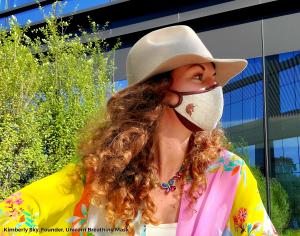Global Green Business Award-Winning California-based Reusable Mask Company Continues to Break Glass Ceilings
This will have a substantial environmental impact with a warning that repeated exposure could be hazardous as the substances found have known links to cell death, genotoxicity and cancer formation.”
— Research conducted in May 2021 by UK's Swansea University
LOS ANGELES, CA, UNITED STATES, December 13, 2022 /EINPresswire.com/ -- As the holidays bring cold winter weather and indoor gatherings, many are reconsidering their mask options. Public awareness around face mask fit/leakage has many turning to N95 or KN95 disposables as recommended by public health professionals. However as more
data is being accumulated regarding the long-term impacts of disposable mask-wearing, concerns over risks of environmental pollution and human health are now top of mind. Research conducted in May 2021 by the United Kingdom's Swansea University as supported by the Institute for Innovative Materials Processing and Numerical Technologies (IMPACT) and the SPECIFIC Innovation and Knowledge Center, have uncovered high levels of heavy metal pollutants, including lead, antimony, and copper, within the silicon-based and plastic fibers of common disposable face masks.The continual reliance on single-use plastic masks, with approximately 200 million a day being produced in China alone, and the associated waste from the chemical pollutants discovered within them has been documented as a new cause of alarming levels of global environmental pollution. The study aimed to explore the direct link of concerning mask pollution, with the level of toxic substances uncovered in common disposable masks. Outlined in their extensive peer-reviewed study, Swansea University scientists wrote: The findings reveal significant levels of chemical pollutants in all the variety of available disposable masks tested -- with micro/nanoparticles and heavy metals released into the water during all tests. This will have a substantial environmental impact and, in addition, raise the question of the potential damage to public health, with a warning that repeated exposure could be hazardous as the substances found have known links to cell death, genotoxicity and cancer formation.
The research team included Professor Trystan Watson, Dr. Javier Delgado Gallardo and Dr. Geraint Sullivan. Project lead Dr. Sarper Sarp of Swansea University College of Engineering said after completing the study in May 2021: "There is a need to understand the impact of such particle leaching on public health. One of the main concerns with these particles is that they were easily detached from face masks and leached into the water with no agitation, which suggests that these particles are mechanically unstable and readily available to be detached. Therefore, a full investigation is necessary to determine the quantities and potential impacts of these particles leaching into the environment, and the levels being inhaled by users during normal breathing. This is a significant concern, especially for health care professionals, key workers, and children required to wear masks for large proportions of the working or school day."
In their continual commitment to providing a healthy, non-toxic solution California-based women-owned Unicorn Breathing Mask has introduced a new ASTM F3502 Level 2/Level 2 Sustainable Disposable Mask, as well as continuing to provide their CDC-approved Organic, Reusable ASTM F3502 mask that doesn't involve the use of toxic heavy metals found in current disposable masks. Unicorn's disposable mask features incredibly high breathability (2.1 mm h20) coupled with Level 2 High-Performance particle efficiency and features natural New Zealand wool fiber technology. Alternatively, their stylish high-thread count Organic Cotton Reusable face mask utilizes safe and non-toxic 15+ mile continuous electrospun nanofiber disposable filters, thousands of times thinner than a human hair, capable of capturing particles as small as 0.1 microns with 99% efficiency while maintaining a low 5.9mm breathability. Unicorn Breathing Mask Founder Kimberly Sky states, "Our reusable nanotechnology filtered mask, and new sustainable disposable mask, are manufactured by a health-conscious company out of New Zealand that is committed to maintaining a low carbon footprint using safe materials. The Unicorn mask tests down to a much smaller particle size with greater efficiency ratings than nanotextiles and features dramatically higher breathability, greater thermal comfort (far less moisture buildup), and is much more lightweight (less than 1mm thick). We encourage you to do your research with all filtered mask companies and note the differences in verified USA lab-tested results. You and your family deserve to breathe pure!"
ASTM medical masks that are tested to the F2100 standard can often be confused with ASTM F3502 face masks. The ASTM F2100 standard tests the filter material only as opposed to the whole mask, and therefore doesn't account for how well the mask filters when actually worn on your face, using different-sized particles to measure filtration efficiency than the F3502 test. The velocity, distance, speed and polarity of the particles are all different, resulting in a less rigorous challenge. The ASTM F2100 specification offers up this caveat clearly, saying it “only evaluates the materials used in the construction of the medical face mask, and not the seal." In one case, a popular Level 3 mask that surpassed 90% on a materials-only basis, filtered only 11% of particulate matter when worn by an actual human being. N95s that must be properly fitted to the individual wearer and discarded daily in order to maintain stated efficiency levels have also undergone several peer-reviewed studies demonstrating concern for their rigidity. Even the smallest of gaps caused by the rigid material not sealing properly to the face have been shown to cause them to lose a disproportionate amount of filtration compared to more flexible reusable filter masks. There is also a concern for N95s lack of breathability (airflow resistance limit for inhalation is 35mm, more than double the maximum breathability resistance allowed under the F3502 standard), particularly among young people and seniors, or those with breathing difficulties or chemical sensitivities.
Sky continues, "There are non-toxic long-term sustainable solutions for disposable and reusable face-mask wearing as climate change continues to worsen, causing ongoing respiratory illness. It is time to listen to the research and shift to a safer solution."
For more information on the Award-winning Electrospun Nanotechnology featured in the Unicorn ASTM F3502 Reusable Masks and Unicorn Breathing Mask's new Sustainable Disposable Mask, visit https://unicornbreathingmask.com




No comments:
Post a Comment